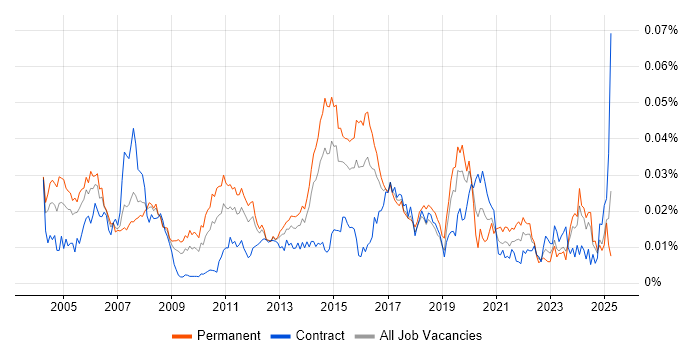Operations Support Engineer
UK
The median Operations Support Engineer salary in the UK is £40,000 per year, according to job vacancies posted during the 6 months leading to 4 May 2025.
The table below provides salary benchmarking and summary statistics, comparing them to the same period in the previous two years.
| 6 months to 4 May 2025 |
Same period 2024 | Same period 2023 | |
|---|---|---|---|
| Rank | 692 | 872 | 982 |
| Rank change year-on-year | +180 | +110 | +206 |
| Permanent jobs requiring an Operations Support Engineer | 8 | 32 | 12 |
| As % of all permanent jobs advertised in the UK | 0.015% | 0.032% | 0.012% |
| As % of the Job Titles category | 0.017% | 0.034% | 0.013% |
| Number of salaries quoted | 5 | 10 | 10 |
| 10th Percentile | - | £27,000 | - |
| 25th Percentile | £32,000 | £27,188 | £45,000 |
| Median annual salary (50th Percentile) | £40,000 | £34,250 | £46,250 |
| Median % change year-on-year | +16.79% | -25.95% | +23.33% |
| 75th Percentile | £45,000 | £42,500 | £62,500 |
| 90th Percentile | £52,500 | - | £65,000 |
| UK excluding London median annual salary | £32,000 | £34,250 | £47,500 |
| % change year-on-year | -6.57% | -27.89% | +52.57% |
All Permanent IT Job Vacancies
UK
For comparison with the information above, the following table provides summary statistics for all permanent IT job vacancies. Most job vacancies include a discernible job title that can be normalized. As such, the figures in the second row provide an indication of the number of permanent jobs in our overall sample.
| Permanent vacancies in the UK with a recognized job title | 47,541 | 93,322 | 94,998 |
| % of permanent jobs with a recognized job title | 90.35% | 94.63% | 91.54% |
| Number of salaries quoted | 27,467 | 66,921 | 59,760 |
| 10th Percentile | £30,000 | £28,500 | £32,500 |
| 25th Percentile | £42,000 | £38,500 | £45,000 |
| Median annual salary (50th Percentile) | £57,500 | £52,550 | £60,000 |
| Median % change year-on-year | +9.42% | -12.42% | - |
| 75th Percentile | £75,000 | £71,250 | £81,250 |
| 90th Percentile | £97,500 | £90,000 | £100,000 |
| UK excluding London median annual salary | £52,000 | £50,000 | £53,000 |
| % change year-on-year | +4.00% | -5.66% | +6.00% |
Operations Support Engineer
Job Vacancy Trend
Job postings that featured Operations Support Engineer in the job title as a proportion of all IT jobs advertised.

Operations Support Engineer
Salary Trend
3-month moving average salary quoted in jobs citing Operations Support Engineer.
Operations Support Engineer
Salary Histogram
Salary distribution for jobs citing Operations Support Engineer over the 6 months to 4 May 2025.
Operations Support Engineer
Top 10 Job Locations
The table below looks at the demand and provides a guide to the median salaries quoted in IT jobs citing Operations Support Engineer within the UK over the 6 months to 4 May 2025. The 'Rank Change' column provides an indication of the change in demand within each location based on the same 6 month period last year.
| Location | Rank Change on Same Period Last Year |
Matching Permanent IT Job Ads |
Median Salary Past 6 Months |
Median Salary % Change on Same Period Last Year |
Live Jobs |
|---|---|---|---|---|---|
| England | +156 | 8 | £40,000 | +16.79% | 3 |
| UK excluding London | +174 | 6 | £32,000 | -6.57% | 4 |
| Yorkshire | +75 | 3 | - | - | |
| North of England | +58 | 3 | - | - | 3 |
| Midlands | +48 | 3 | £32,000 | -20.00% | |
| Work from Home | +168 | 2 | £32,000 | - | 1 |
| London | +103 | 2 | £50,000 | - | |
| West Midlands | +46 | 2 | £32,000 | - | |
| South East | - | 2 | £32,000 | - | |
| East Midlands | +36 | 1 | £40,000 | - |
Operations Support Engineer Skill Set
Top 30 Co-occurring Skills and Capabilities
For the 6 months to 4 May 2025, Operations Support Engineer job roles required the following skills and capabilities in order of popularity. The figures indicate the absolute number co-occurrences and as a proportion of all permanent job ads featuring Operations Support Engineer in the job title.
|
|
Operations Support Engineer Skill Set
Co-occurring Skills and Capabilities by Category
The follow tables expand on the table above by listing co-occurrences grouped by category. The same employment type, locality and period is covered with up to 20 co-occurrences shown in each of the following categories:
